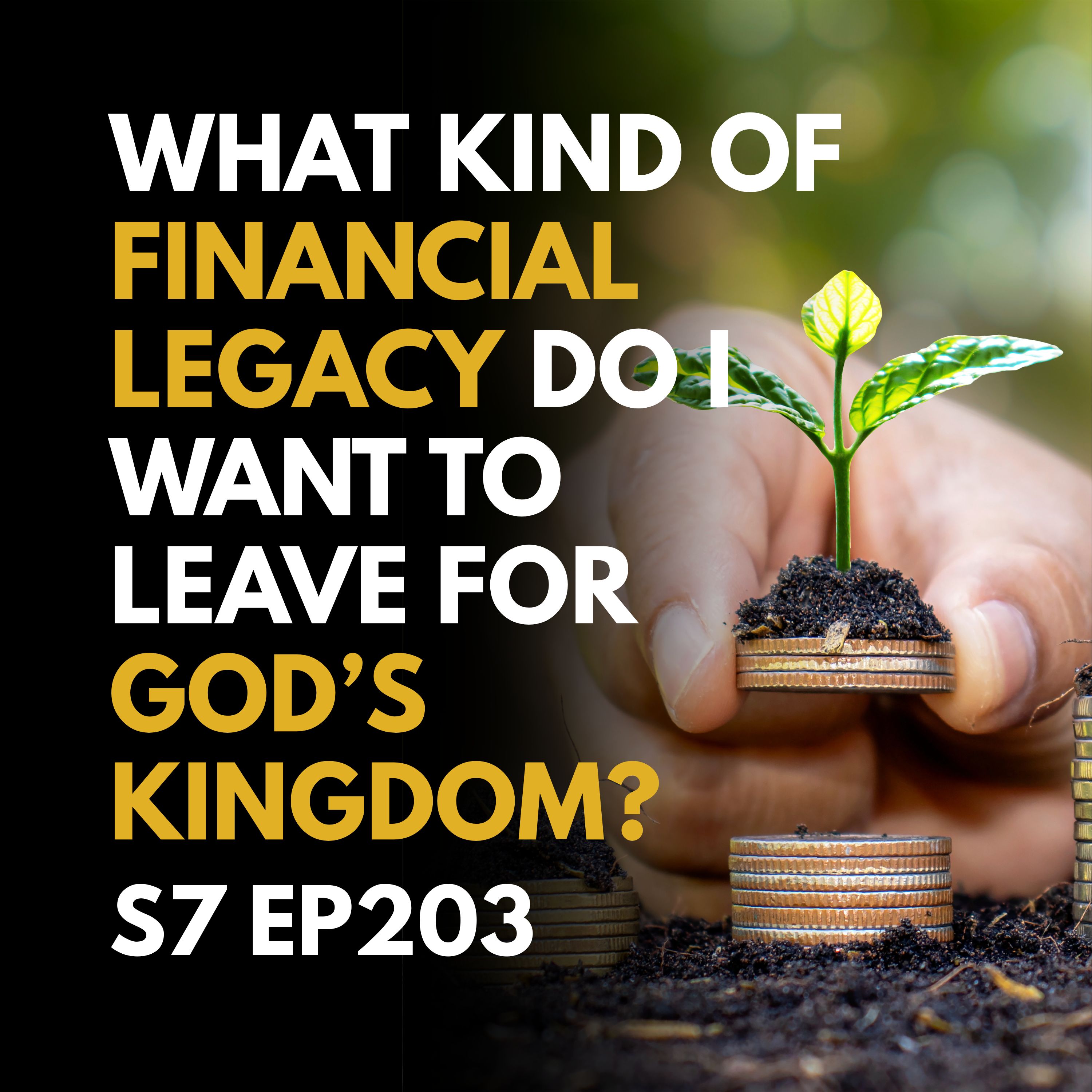How Can Your Money Make an Eternal Impact?

Redefining Financial Legacy Through Faith
The concept of a "financial legacy" often evokes images of millionaires passing down vast fortunes. Yet this conventional view misses the broader truth: anyone, regardless of income, can leave a lasting financial impact on their family or a charitable cause. At its core, a financial legacy means intentionally passing along something of value—such as savings, a home, a business, or other assets—to designated beneficiaries. A strong legacy is not defined by wealth alone, but by thoughtful preparation through tools like retirement savings, wills, and life insurance. How Can Your Money Make an Eternal Impact?
For Christians, legacy is more than passing on wealth—it’s about transferring faith, values, and wisdom. True legacy includes modeling generosity, equipping the next generation, and stewarding both finances and relationships to reflect God’s purposes. Wealth becomes a tool for spiritual growth, not the goal.
Financial planning is a spiritual act. Scripture declares that God owns everything (Psalm 24:1); we are His stewards. Planning with a Kingdom mindset transforms assets into lasting impact—supporting missions, caring for others, and fulfilling the Great Commission.
Key biblical principles guide this stewardship:
Ownership: Everything belongs to God.
Faithfulness: God values responsible management (Matt. 25:14–30).
Contentment: Trusting God’s provision (1 Tim. 6:6–7).
Generosity: Giving joyfully resists greed (2 Cor. 9:7).
Debt Awareness: Avoiding financial bondage (Prov. 22:7).
A faithful legacy leaves not just wealth—but a witness.
Table: Core Biblical Stewardship Principles
Principle | Brief Description | Key Scripture Reference |
God's Ownership | Everything we possess—money, time, talents—belongs to God; we are His appointed managers. | Psalm 24:1, Deuteronomy 8:18 |
Responsibility | We are entrusted with resources to manage for God's revealed purposes and the common good. | Genesis 1:28, Luke 12:48 |
Accountability | We will ultimately give an account to God for how we managed His provisions. | Matthew 25:14-30, Matthew 12:36 |
Contentment | Finding deep satisfaction and joy in God's provision, independent of material possessions. | 1 Timothy 6:6-7, Philippians 4:12-13 |
Avoiding Debt | Diligently striving for freedom from financial burdens to experience peace and freedom. | Proverbs 22:7 |
Generosity | Giving cheerfully, sacrificially, and without compulsion, blessing others and advancing God's Kingdom. | 2 Corinthians 9:7, Proverbs 11:25 |
Faithfulness | Utilizing all resources—time, talents, money, relationships, and the Gospel—wisely and purposefully for God's glory. | Luke 16:10, 1 Corinthians 4:2 |
III. Crafting Your Kingdom Legacy: More Than Just Money
A meaningful Christian legacy goes beyond money. It shapes future generations through faith, character, family heritage, and life wisdom. The greatest inheritance is a life devoted to God—where faith itself becomes the legacy.
Families should prayerfully identify five core legacy values they want to pass on, reflecting on time use and spiritually formative experiences—such as church involvement or mentorship. These insights can reveal a calling to pass on Scripture, generosity, servant leadership, or prayer. The goal is to be remembered not just for material provision, but for modeling faith, love, and discipleship. Wealth becomes a tool, not the end goal.
Equipping Future Generations
Legacy planning includes preparing heirs spiritually and practically. Proverbs 20:21 warns that unearned wealth without wisdom can harm. Inheritance without preparation can fuel entitlement or dependency.
To prevent this, families can:
Hold annual meetings to discuss values
Share stories of God’s faithfulness
Provide financial coaching
Fund service or faith-building experiences
Wisdom must accompany wealth. Teaching stewardship ensures your legacy is a blessing, not a burden.
IV. Strategic Financial Planning for God’s Kingdom
Generosity as Core Strategy
Generosity belongs at the heart of Christian financial planning. Tithing and planned giving should be prioritized like saving or debt reduction. A “Generosity Fund” in your budget helps you give regularly and responsively.
Estate Planning as Worship
Estate planning is an act of stewardship. Wills, trusts, POAs, and proper beneficiary designations ensure assets are distributed wisely and reflect your values. This planning honors God by continuing Kingdom impact after death.
Advanced Giving Tools
DAFs: Donate now, give later; ideal for appreciated assets; tax-efficient.
CRTs: Provide income and give the remainder to charity; reduce taxes.
Gift Annuities / Pooled Funds: Offer lifetime income and ministry support.
Appreciated Assets: Avoid capital gains by giving stocks, property, or business interests.
Life Insurance / Retirement Accounts: Leverage large gifts with small inputs.
When used wisely, these tools maximize impact and reflect faithful, eternal stewardship.
Table: Planned Giving Vehicles for Kingdom Impact
Vehicle | Description | Key Benefits for Donor | Kingdom Impact | Considerations |
Donor-Advised Fund (DAF) | Irrevocable contribution to a fund, then recommend grants to charities over time. | Immediate tax deduction, tax-free growth, flexibility, convenience, centralized giving, anonymity, removed from estate. | Provides long-term, sustainable funding for chosen ministries; allows for diverse asset donations. | Irrevocable gift; critical to choose biblically aligned sponsoring organization. |
Charitable Remainder Trust (CRT) | Irrevocable transfer of assets to a trust, providing income to donor/beneficiary for life/term, remainder to charity. | Immediate income tax deduction, avoids capital gains tax on appreciated assets, potential estate tax reduction, reliable income stream (fixed/variable). | Supports specific mission areas with substantial, long-term gifts; can grow over time. | Irrevocable nature; complex legal setup; minimum contribution requirements. |
Charitable Gift Annuity (CGA) | Contract where donor makes a gift in exchange for fixed annuity payments for life; remainder to charity. | Immediate income tax deduction, fixed income for life, partial tax-free payments. | Simple way to make a significant gift while retaining income; supports chosen charity directly. | Irrevocable gift; payment rate depends on age; minimum gift amount. |
Bequest via Will/Trust | Naming a charity as a beneficiary in a will or living trust. | Retains control of assets during lifetime; potential estate tax deduction. | Simplest way to leave a significant legacy; supports specific ministries after death. | Requires a legally valid will/trust; can be changed during lifetime. |
Gifts of Appreciated Stock/Real Estate | Donating assets that have increased in value (e.g., stocks, property). | Avoids capital gains tax on appreciation, immediate income tax deduction. | Maximizes impact by avoiding tax on capital gains, more funds go to charity. | Requires proper valuation and transfer; often handled by DAFs or CRTs. |
Life Insurance/Retirement Accounts | Naming a church/ministry as a direct beneficiary of a policy or account. | Simple and effective; can leverage smaller premiums into larger gifts; avoids probate. | Can provide substantial future gifts to ministries; avoids certain taxes for heirs. | Beneficiary designations supersede wills; requires careful coordination with estate plan. |
V. Overcoming Common Misconceptions and Challenges
Many Christians hold financial misconceptions that hinder faithful stewardship. Common myths include:
Myth 1: Faith-based planning minimizes wealth.
Truth: Wealth is a tool—it's the love of money that is sinful (1 Tim. 6:10).
Myth 2: Tithing limits growth.
Truth: Generosity opens doors to blessing and cultivates discipline (Luke 6:38).
Myth 3: It’s just about budgeting.
Truth: True stewardship includes saving, investing, and legacy planning from a Kingdom lens.
Myth 4: Faith-based investing avoids stocks.
Truth: Biblically Responsible Investing (BRI) aligns values with market participation.
Myth 5: It's only for pastors or the wealthy.
Truth: Every believer is called to steward God’s resources (Luke 16:10).
Replacing these myths with biblical truth fosters peace and purposeful action.
Navigating Family Dynamics
Inheritance can cause division if not addressed clearly. Proverbs 13:22 supports legacy planning, but Proverbs 20:21 warns of unprepared wealth. Clear plans and open communication—through family meetings or legacy letters—foster unity and understanding. The goal is not just wealth transfer, but spiritual well-being and Kingdom impact.
Review and Professional Counsel
Estate plans should be reviewed every 3–5 years or after major life changes. Seek faith-aligned professionals—Christian advisors or estate lawyers—to ensure plans stay biblically grounded and up to date.
VI. Living a Legacy Now
Legacy starts today.
Kingdom Budgeting: Tithe and give first (Matt. 6:33). Budgeting becomes worship.
Ethical Investing: Invest in alignment with biblical values.
Modeling Faith: Live generously and involve your family in giving and service.
VII. Conclusion: An Eternal Investment
Faithful financial stewardship impacts eternity. Jesus asked, “If you are untrustworthy with worldly wealth, who will trust you with the true riches of heaven?” (Luke 16:11).
Live with purpose. Manage God’s resources with trust, faith, and vision for eternal impact.












